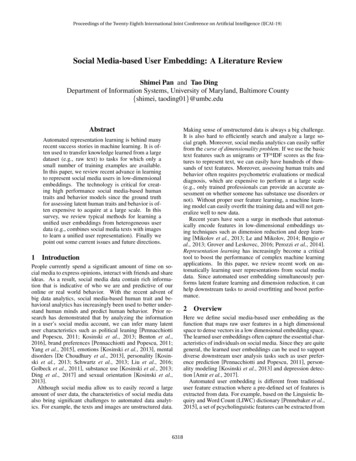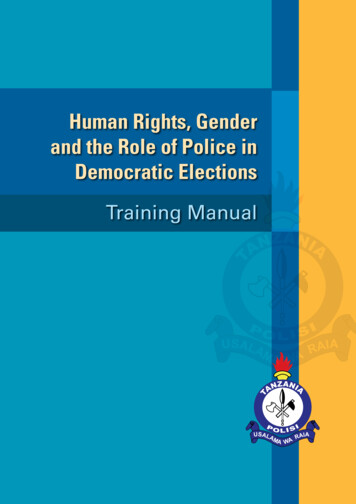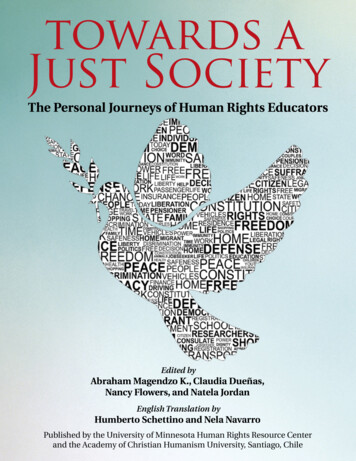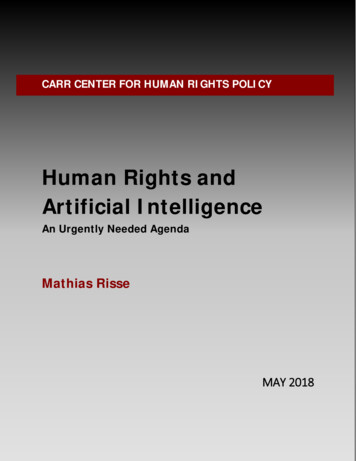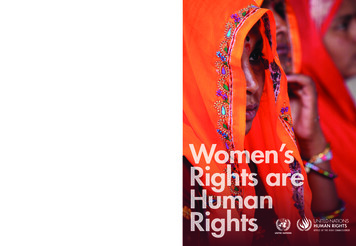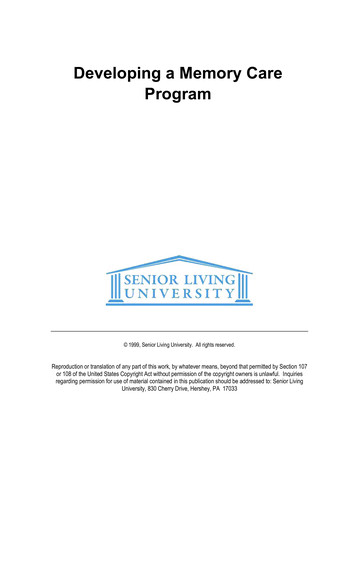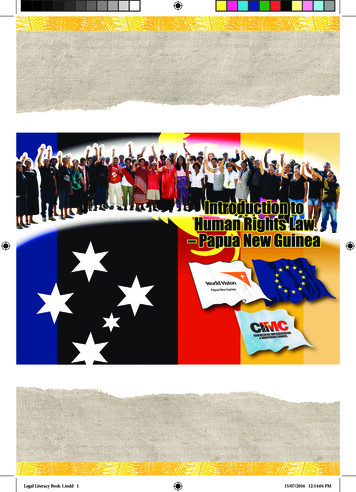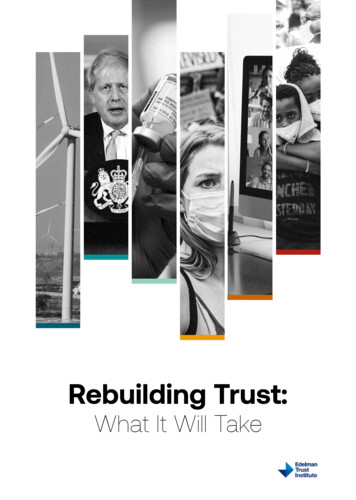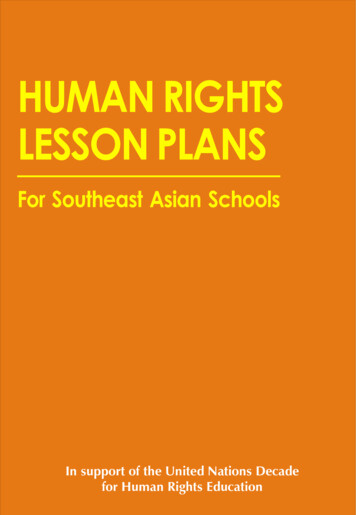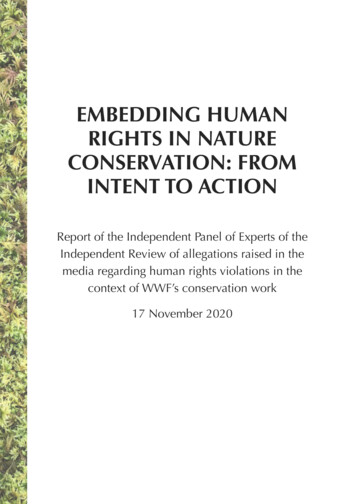
Transcription
EMBEDDING HUMANRIGHTS IN NATURECONSERVATION: FROMINTENT TO ACTIONReport of the Independent Panel of Experts of theIndependent Review of allegations raised in themedia regarding human rights violations in thecontext of WWF’s conservation work17 November 2020
TABLE OF CONTENTSExecutive Summary1Chapter 1Introduction20Chapter 2WWF Structure and Governance22Chapter 3Relevant Human Rights Norms and WWF Commitments29Chapter 4Cameroon: Boumba Bek, Nki, and Lobéké National Parks42Chapter 5Democratic Republic of Congo: Salonga National Park69Chapter 6Central African Republic: Dzanga Sangha Protected Area87Chapter 7Republic of Congo: Messok Dja95Chapter 8Nepal: Chitwan National Park111Chapter 9India: Kaziranga National Park123Chapter 10 WWF International and the WWF Network131Chapter 11150Recommendations
EMBEDDING HUMAN RIGHTS IN NATURECONSERVATION: FROM INTENT TO ACTIONEXECUTIVE SUMMARYIn April 2019, the World Wide Fund For Nature (WWF) appointed an Independent Panel ofExperts consisting of Judge Navi Pillay (Chair), Professor John H. Knox, and Dr KathyMacKinnon to lead an Independent Review into WWF’s role in connection with allegedhuman rights abuses in and around protected areas supported by WWF in Cameroon, theCentral African Republic, the Democratic Republic of Congo, the Republic of Congo, Nepaland India. The alleged abuses included instances of murder, rape, torture and physicalbeatings committed by rangers1 and other law-enforcement agents acting under the authorityof governments, which were described in a series of articles published in BuzzFeed Newsand the Kathmandu Post in March and April 2019.The Panel’s mandate, as set out in its terms of reference, was to:lreview, examine and assess WWF‘s role in connection with the allegations;lpropose to WWF suitable measures, procedures and processes to prevent similarallegations and occurrences in the future, including a review and examination of thepresence and effectiveness of WWF’s broader policies and procedures, projectgovernance, and assurance and risk management processes in the context of theallegations; andladvise on future approaches to spatial conservation, based on the Panel’s recognisedcollective expertise in human rights, development and conservation.The focus of the inquiry was therefore not on whether the rangers and other law-enforcementagents had committed the specific alleged abuses. Rather, the Panel’s focus was on theallegations against WWF, including in particular that WWF knew about the alleged abusesby rangers and other agents but nevertheless continued to support and collaborate withthem, and that WWF failed to take effective steps to prevent, respond to and remedy thealleged abuses. There were no allegations that WWF staff directed or participated in any ofthese alleged abuses, and the Panel saw no evidence that they had done so. In some cases,WWF was also accused of not respecting the rights of indigenous peoples in its activities insupport of existing and proposed protected areas.This report provides the Panel’s factual findings in relation to the allegations against WWF,its assessment of whether WWF’s actions were appropriate and consistent with itsresponsibility to respect human rights, and the Panel’s recommendations on the actionsWWF should take going forward.BackgroundAt the outset, it is necessary to understand WWF’s complex organisational structure, itssocial policies and commitments, and its human rights responsibilities.1The term ‘rangers’ includes ‘ecoguards’, which is the term used in the Congo Basin countries – Cameroon, theCentral African Republic, the Democratic Republic of Congo and the Republic of Congo.1
Embedding Human Rights in Nature Conservation: From Intent to ActionWWF as an organisationThe WWF Network is the collective term used to describe all organisations around the worldoperating under the WWF name and panda symbol. The WWF Network comprises WWFInternational and 36 legally independent WWF National Organisations.Each WWF National Organisation is governed by its own independent national board, whichhas ultimate responsibility for its policies, management and finances. National Organisationscan fundraise for work in their own countries and for international projects that may comeunder the management authority of WWF International or another WWF NationalOrganisation.WWF International, which is based in Switzerland, operates as the Secretariat for the entireNetwork. WWF International is also the Home Office that is legally responsible for 31Programme Offices, four of which are the subject of chapters of this report: WWF Cameroon,WWF Central African Republic, WWF Democratic Republic of Congo, and WWF Gabon(which managed WWF’s activities in Republic of Congo during the period covered by thisreport). Programme Offices are responsible for carrying out WWF programmes and projectsin the countries where they are located. Similarly, WWF US, a National Organisation, is theHome Office for 17 Programme Offices, including WWF Nepal. WWF India is a NationalOrganisation operating under Indian laws and regulations, but able to receive funds fromother National Organisations for its projects.The highest governing body of the WWF Network is the International Board. The Board’sfunction is to set overall strategy and priorities that can be supported by the whole Network.It is ultimately responsible for the conduct, administration and representation of WWFInternational.Neither the International Board nor the WWF International Secretariat has the authority toinstruct the National Organisations. To be effective, the strategies and priorities set by theInternational Board must be supported by the Network and adopted by the NationalOrganisations.WWF human rights and other social policiesBeginning with its 1996 Statement of Principles on Indigenous Peoples and Conservation,WWF has adopted a range of social policies at the International and Network levels thatincorporate human rights commitments, including to recognise and protect the rights ofindigenous peoples and local communities.In 2009, WWF and other conservation organisations founded the Conservation Initiative forHuman Rights and adopted the Conservation and Human Rights Framework. In theFramework, WWF and the other organisations made ten commitments, the first of which is:“Respect internationally proclaimed human rights; and make sure that we do notcontribute to infringements of human rights while pursuing our mission.”The other commitments in the Conservation and Human Rights Framework elaborate andsupplement this overarching commitment to respect human rights.WWF reaffirmed its Statement of Principles on Indigenous Peoples and Conservation in2008, and in 2018 it adopted Network Guidelines on Prevention of Restriction of Rights andInvoluntary Relocation and Resettlement of Indigenous Peoples and Local Communities.2
Embedding Human Rights in Nature Conservation: From Intent to ActionThose Guidelines state that all WWF offices, programmes and initiatives must take intoconsideration the respect of human rights in the design, implementation and monitoring ofprogrammes, which extends to addressing actual and potential infringement of and/orrestrictions on the rights of indigenous peoples and local communities. This includescustomary rights to lands and resources and interventions requiring the free, prior andinformed consent of affected communities.The commitments in the Conservation and Human Rights Framework, the Statement ofPrinciples, the Network Guidelines and WWF’s other social policies are consistent withuniversal and regional instruments on the responsibility to respect human rights.International human rights lawThe alleged abuses by rangers and other government employees described in this reportwould violate many provisions of human rights law governing the rights to life, liberty,property, security of person, and effective remedies, as well as the rights to freedom fromviolence against women, arbitrary detention, torture, and arbitrary interference with homeand family life. Those standards are set out in United Nations human rights treaties andother instruments and in African regional treaties applicable to the Congo Basin countries.Allegations of abuses against indigenous peoples also implicate their rights underinternational law. The two most important international instruments on the rights ofindigenous peoples are the International Labour Organization (ILO) Convention No. 169 onIndigenous and Tribal Peoples and the 2007 United Nations Declaration on the Rights ofIndigenous Peoples (UNDRIP), which although not a treaty has been generally accepted bystates as setting benchmark standards in relation to indigenous rights. UNDRIP makes clearthat the free, prior and informed consent (FPIC) of indigenous peoples is necessary beforethe adoption or implementation of any laws, policies or measures that may affect them, andin particular before the approval of any project affecting their lands, territories or resources,including the extraction or exploitation of mineral, water or other resources.WWF’s responsibility to respect human rightsThe United Nations Guiding Principles on Business and Human Rights (the UN GuidingPrinciples) are not legally binding but provide valuable guidance for the implementation ofWWF’s human rights commitments. Although the UN Guiding Principles were developed inthe context of business enterprises, they are also applicable to WWF and other internationalconservation organisations.The foundational principle of the responsibility to respect human rights, as set out in the UNGuiding Principles, is that enterprises “should avoid infringing on the human rights of othersand should address adverse human rights impacts with which they are involved.” Theresponsibility to respect human rights requires international conservation organisations:(a) to avoid causing or contributing to adverse human rights impacts through their ownactivities, and to address such impacts when they occur; and(b) to seek to prevent or mitigate adverse human rights impacts that are directly linkedto their operations, products or services by their relationships, even if they have notcontributed to those impacts.The rights to be respected include those set out in the Universal Declaration of Human Rights,the International Covenant on Civil and Political Rights, and the International Covenant onEconomic, Social and Cultural Rights, but the scope of the UN Guiding Principles extends to3
Embedding Human Rights in Nature Conservation: From Intent to Actionall internationally recognised human rights, including the rights of indigenous peoples andlocal communities.The actions that WWF should take in response to potential or actual human rights impactsdepend on whether it causes, contributes to, or is directly linked to those impacts. If WWFcauses or may cause an adverse human rights impact, it should take the necessary stepsto cease or prevent the impact. If WWF contributes or may contribute to an adverse humanrights impact, it should take the necessary steps to cease or prevent its contribution, anduse its leverage to mitigate any remaining impact to the greatest extent possible. If WWFhas not contributed to an adverse human rights impact, but its relationship with another entitydirectly links its operations to the impact, the appropriate response will depend on a numberof factors, including the severity of the adverse impacts.WWF’s overarching responsibility to respect human rights requires WWF to:(a) adopt a high-level policy commitment to meet its responsibility to respect humanrights and to reflect this commitment in operational policies and procedures;(b) establish and implement a human rights due-diligence process;(c) provide for processes to enable the remediation of any adverse human rights impactsthat WWF causes or to which it contributes; and(d) ensure that WWF safeguards the rights of the most vulnerable, including indigenouspeoples and local communities, in relation to activities it carries out or supports.WWF’s human rights commitments often set higher standards than the laws and practicesof countries in which it works. In such situations, WWF must nevertheless comply with itsown commitments to respect human rights.Protecting the rights of those who live closest to nature is not just required by human rightslaw; it is also often essential to ensure the protection of biodiversity. As WWF has recognised,respect for human rights is complementary, not contradictory, to the conservation of nature.Country-specific FindingsThe Panel examined the allegations in respect of each of the six countries covered by thisreport, and it has set out its findings in country-specific chapters (Chapters 4 to 9). Differencesin the detail of the analyses conducted for each country reflect differences in the nature andcomplexity of the country situations. The Panel has made country-specific recommendationsin each country chapter and recommendations directed to the WWF Network as a whole inChapter 11.Cameroon – Boumba Bek, Nki, and Lobéké National ParksWWF Cameroon staff heard allegations of beatings and physical violence carried out byecoguards in the parks in south-eastern Cameroon as early as 2008. WWF does not havea role in appointing or directing ecoguards, but it has continued to fund, support andcollaborate with ecoguards in a variety of ways, including by providing equipment andmaterial support, paying bonuses, and deciding whether to approve proposals for fundedoperations, including ecoguard patrols. Knowledge of allegations of abuse and continuingsupport for ecoguards are not by themselves necessarily contrary to human rights standards.The key issue is whether WWF has taken sufficient actions to prevent, respond to, andremedy alleged abuses in order to fulfil its responsibility to respect human rights.4
Embedding Human Rights in Nature Conservation: From Intent to ActionUntil recent years, WWF had not taken adequate steps to fulfil that responsibility. Before itdeveloped an action plan in 2016, WWF Cameroon had not operationalised its human rightscommitments in its work and ensured that it had the necessary capacity to implement themand to address any adverse impacts of its support for patrols. WWF Cameroon has takenpositive steps since 2016 to address human rights issues, including by: commissioningindependent reviews of human rights allegations; hiring a community coordinator with amandate to focus on relations with indigenous peoples and local communities; building closerties with local civil society organisations, the Ministry of Social Affairs and the NationalCommission on Human Rights and Freedoms in order to support indigenous rights;supporting efforts to negotiate and conclude Memorandums of Understanding (MOUs) onaccess rights for the Baka people to the protected areas in south-eastern Cameroon; andsupporting a local complaint mechanism.However, WWF still needs to do more to safeguard the human rights of indigenous peoplesand local communities in and around the three national parks in that region, including by:(a) making clear to the government that adopting an ecoguard code of conduct andimplementing it through a rapid response structure that incorporates appropriatesanctions are requirements for WWF continuing to provide support to the ecoguards;(b) making greater efforts to influence the government to recognise and protect theaccess rights of the Baka in the protected areas; and(c) regularly assessing and reporting on its progress towards implementation of themeasures it is taking to address human rights.WWF Cameroon states that it is developing a strategy to guide implementation of its socialpolicies in conservation projects. It is critical that this strategy is developed and implementedin consultation with the indigenous peoples and local communities themselves.Democratic Republic of Congo – Salonga National ParkWWF has worked in Salonga National Park since 2005. In August 2015, it entered into aco-management agreement with the Institut Congolais pour la Conservation de la Nature –ICCN, which has authority over national parks in the Democratic Republic of Congo (DRC).Under the co-management MOU, WWF DRC appointed the park director but ICCN has haddirection of the ecoguards. WWF provided substantial technical and financial support to theecoguards. Before WWF entered into the MOU, it was aware of the potential for humanrights abuses by ecoguards, but it did not carefully assess the human rights risks or developan effective plan to prevent and respond to abuses. In December 2016, WWF field staffreported allegations of human rights abuses to senior WWF DRC officials. WWF could andshould have developed and implemented an appropriate response as quickly as possibleafter the allegations arose. Unfortunately, a decision by the WWF DRC Senior ManagementTeam in March 2017 to investigate the allegations, and to initiate a study with a nationalNGO to investigate the relationship of the park with the local communities, was neverimplemented, apparently out of concern that doing so would meet with resistance from ICCN.A desire to avoid conflicts with the government cannot excuse WWF from complying with itsresponsibility to respect human rights.The WWF donor National Organisations that were also engaged in the DRC through fundingfor Salonga, including WWF Germany and WWF US, should have shared responsibility withWWF DRC (and by extension WWF International) for ensuring that WWF human rightscommitments were met in relation to the ecoguard and other park operations that they weresupporting. The WWF Network, and WWF International in particular, had not embedded the5
Embedding Human Rights in Nature Conservation: From Intent to Actionnecessary institutional capacity or established clear lines of communication and responsibilityon these issues, and WWF International did not have effective oversight of its ProgrammeOffice (WWF DRC).After detailed allegations of abuse were raised by civil society organisations in 2018, WWFInternational took the lead in developing response measures, including by commissioningtwo investigations in 2019 that identified widespread allegations of extremely grave abusesby ecoguards and army personnel, including allegations of multiple murders, rapes, tortureand beatings. WWF International adopted an action plan in April 2019, which included urgingICCN to approve and implement a code of conduct for ecoguards; ensuring that eachecoguard receives human rights training; improving measures for monitoring patrol missions;agreeing with ICCN on Standard Operational Procedures for investigating allegations andimposing disciplinary measures; referring identified cases to the authorities for prosecution;and setting up a complaint mechanism for local residents. As of July 2020, the training hadbeen partially implemented, and some cases had been referred to the relevant militaryauthorities but had not resulted in prosecution. The code of conduct had not been approvedand the other listed elements of the plan had not been implemented.WWF has not fulfilled its human rights commitments in relation to activities it supports inSalonga National Park. There are systemic problems in relation to the National Park and itsecoguards that are not easy to solve, some of which are beyond WWF’s control.Nevertheless, to meet its responsibility to respect human rights, WWF must address theseissues more consistently and effectively, including by:(a) establishing a monitoring system for ecoguard patrols;(b) introducing an effective complaint mechanism; and(c) ensuring that the park management institutes a procedure that provides for:suspension of ecoguards against whom credible allegations are raised; independentinvestigation of allegations; remedies to victims; and disciplinary punishments by thepark management itself, including, as appropriate, suspension, termination andreferral for criminal prosecution.An underlying problem relates to restrictions on community access to the park forsubsistence hunting, fishing, and gathering of non-timber forest products. Through its rolein management of Salonga National Park and its engagement with ICCN, WWF shouldinfluence the planning and zoning of the area to clarify boundaries and establish zones ofcommunity access and use in and around the park, in order to reflect customary rights andto accommodate local needs.A new MOU for Salonga National Park should clearly set out the respective roles andresponsibilities of WWF and ICCN, including WWF’s conditions and ‘red lines’ for continuedprovision of financial and technical support. WWF should make clear that it cannot continueto provide support for the ecoguards without effective mechanisms in place to monitor theirbehaviour, investigate allegations of abuse, and ensure appropriate disciplinary measuresfor confirmed cases of abuse.Central African Republic – Dzanga Sangha Protected AreaSince the inception of the Dzanga Sangha Protected Area (DSPA) in 1989, it has been comanaged by WWF and the government of the Central African Republic (CAR). Theecoguards who operate in the DSPA are employed and managed by the government. WWFmanages the logistics, financing and training needs of the ecoguards but does not exercise6
Embedding Human Rights in Nature Conservation: From Intent to Actionany control over their daily activities. The allegations in respect of CAR were distinct fromthose made in respect of the other countries in that they did not relate to specific incidentsof alleged abuse against particular persons.It was alleged that WWF CAR helped ecoguards purchase weapons from the army andconcealed the purchase from donors. The Panel found no evidence that WWF CAR providedor procured arms for the ecoguards. It was clear that WWF’s policies prohibit the organisationfrom providing arms to ecoguards but it may have engaged in lobbying the Ministry of Water,Forests, Hunting and Fishing to ensure that ecoguards were properly equipped for antipoaching activities.In addition, it was alleged that WWF hired a private security firm, Maisha Consulting, toengage with the Seleka, a rebel group that was alleged to have committed human rightsabuses. The Panel found that WWF CAR engaged Maisha Consulting for the purpose ofprotecting DSPA in 2013, during a period of civil conflict, when the region was under thecontrol of the Seleka. The Panel assesses that WWF’s instruction of Maisha Consulting tosafeguard the protected area was necessary in the circumstances. It was perfectlyreasonable for WWF to arrange with a private security firm, able and willing to undertakethis high-risk engagement, to enter the protected area and engage directly with the Seleka.This timely intervention by WWF CAR contributed to preserving the protected area and itswildlife, as well as saving the lives of WWF staff within DSPA. There were no human rightsabuses for which WWF bears responsibility.WWF’s support for, and cooperation with, the independent Human Rights Centre (HRC)located in Bayanga is a positive example of a local mechanism to respond to grievancesinvolving the DSPA, and more generally to provide access to justice and civic empowermentfor members of marginalised communities living in and close to the DSPA. Between April2016 and December 2019, the HRC handled some 40 grievances, of which five concernedecoguards and one a DSPA driver. The Panel believes that the HRC makes a valuablecontribution to inclusive conservation and offers potential lessons for WWF offices in othercountries.Republic of Congo – Messok DjaThe eight WWF staff members in the Republic of Congo (ROC) have operated as anextension of the Gabon Programme Office, under the management authority of WWFInternational. In 2005, WWF began working with the ROC government on a jointconservation programme known as Espace TRIDOM Interzone Congo (ETIC), which ismanaged jointly by a government official and a WWF technical advisor. ETIC ecoguards aredirected by the government coordinator, and WWF provides support through salaries,bonuses and equipment. ETIC ecoguards operate in the vicinity of Messok Dja, a forestedarea on the border with Cameroon that is currently covered by two long-term commerciallogging concessions. The government recognised Messok Dja as a potential site for aprotected area in 2011, and WWF has supported that proposal.From at least 2016, WWF has heard of allegations of human rights abuses by ecoguards inthe ETIC/Messok Dja area. WWF should have carefully considered and addressed humanrights issues, including through local consultation, before it signed a new ETIC agreementin February 2016. Doing so would have enabled WWF to include provisions in the agreementmaking clear its standards on human rights, including the expected standards for ecoguardsand the consequences for failure to comply with those standards.7
Embedding Human Rights in Nature Conservation: From Intent to ActionWWF ROC has taken steps since 2018 to try to prevent and address alleged abuses, includingby: hiring a community conservation advisor; supporting human rights training; drafting acode of conduct for ecoguards; instituting a system of observers on ecoguard patrols; anddeveloping a complaint mechanism. For the most part, these steps have been initiated andcarried out by the local WWF staff and ETIC without clear guidance from WWF Internationalor donor offices on how to comply with WWF’s human rights commitments. WWFInternational and the WWF National Organisations working in Messok Dja need to providegreater support to the WWF staff in ROC in order to take a number of additional steps,including:(a) making clear that adoption and effective implementation of the code of conduct areprerequisites for WWF’s continuing support to the ecoguards;(b) ensuring appropriate investigation of allegations and sanctions for misconduct;(c) working towards a revised MOU that fully reflects WWF’s human rights commitmentsas a prerequisite for continuing its partnership with the government;(d) improving the complaint mechanism by providing for independent review ofallegations; and(e) doing more to involve local communities in the development and implementation ofconservation strategies.An FPIC process with indigenous peoples and local communities should have begun assoon as the proposal for a protected area in Messok Dja was first raised, but WWF did notstart to engage with the affected communities until 2017. At this point, local staff tried withsome creativity to develop a meaningful FPIC process. Nevertheless, because theymisunderstood basic aspects of indigenous rights and the FPIC process, the effort did notcomply with international human rights norms or WWF’s own commitments. Theresponsibility for this must rest with WWF International, which had given insufficient guidanceto WWF ROC on how to carry out a proper FPIC process. The Panel emphasises thatMessok Dja is currently subject to logging concessions and mining exploration permits thatplace the indigenous people and local communities, as well as ecosystems, at risk. WhileWWF will no longer be responsible for the FPIC process, the Panel strongly encouragesWWF to work together with indigenous peoples and local communities in this challengingenvironment, in order to protect both biodiversity and human rights.Nepal – Chitwan National ParkMost of WWF’s work in Nepal takes place outside protected areas, working with the ForestryDepartment and communities in the buffer zones around national parks. Park rangers aregovernment employees. Army personnel are also employed for law enforcement withinChitwan and Bardiya National Parks. WWF Nepal has no management authority orresponsibility for national park rangers or army personnel. Nor does it provide them salariesor bonuses, which are paid by the government. WWF provides technical and financialsupport to rangers, through the government, in the form of training, food, bicycles, jeeps,cameras and a real-time monitoring system.WWF Nepal does not appear to have been aware of the majority of human rights abusesalleged to have been committed in and around Chitwan and Bardiya National Parks between2006 and 2016. There is no formal mechanism in place for WWF to be informed of allegedabuses during anti-poaching missions. Where it became aware of alleged incidents, WWFNepal adopted the attitude that any allegation relating to the government or the armed forceswas a matter for the government to address, and it does not appear to have referredconcerns to WWF US (the Home Office for WWF Nepal).8
Embedding Human Rights in Nature Conservation: From Intent to ActionWWF US should have provided additional guidance and support. For example, there is aneed to ensure that WWF US and WWF Nepal staff are clear about how to identify incidentsof alleged human rights abuse and how best to respond to them. It was unclear where WWFUS or WWF Nepal’s ‘red lines’ were in terms of the support WWF provides to thegovernment. Steps should be taken to ensure that compliance with social policies is audited,both at WWF country office level and in respect of work with its partners. In addition, WWFNepal should put in place a formal mechanism to ensure that allegations of human rightsabuses made against rangers and/or the armed forces in areas where WWF works arebrought to its attention. WWF should take such steps as are necessary to satisfy itself thatthe complaints have been adequately addressed.WWF Nepal is committed to working with local communities and indigenous peoples to helpmitigate the restrictions on livelihoods that result from the designation and management ofprotected areas through the provision of alternative livelihood options. WWF Nepal shouldadvocate for reforms to end exclusion of marginalised communities and groups from bufferzone management bodies, and use its best efforts to ensure that current conservationactions and institut
consideration the respect of human rights in the design, implementation and monitoring of programmes, which extends to addressing actual and potential infringement of and/or restrictions on the rights of indigenous peoples and local communities. This includes customary rights to lands and resources and interventions requiring the free, prior and
